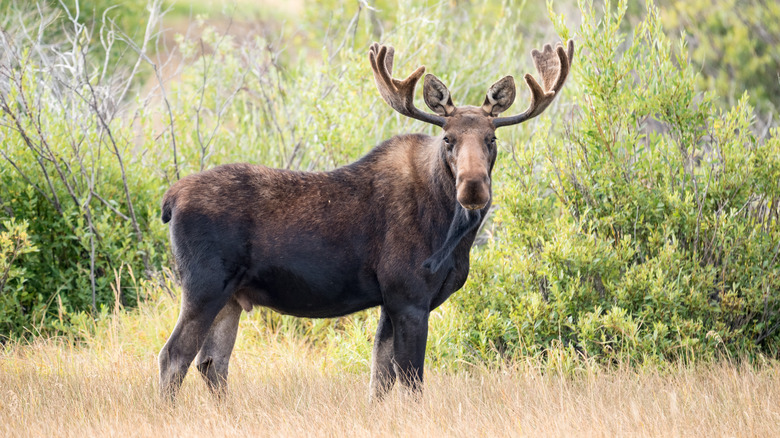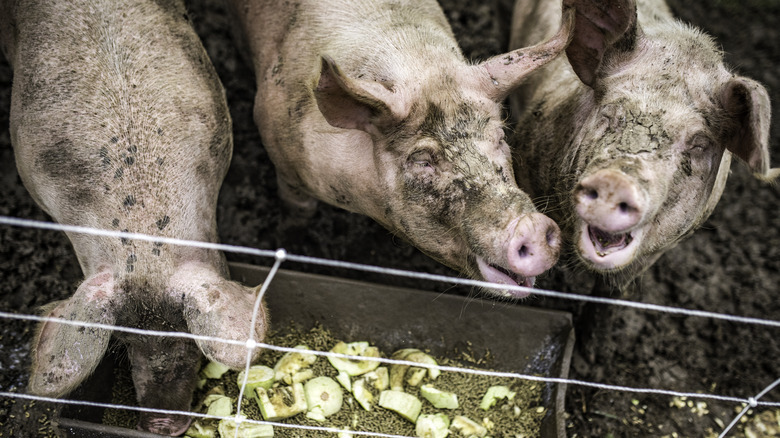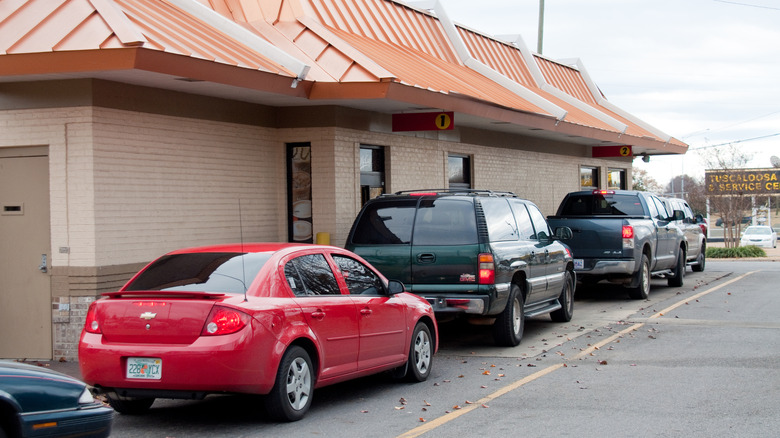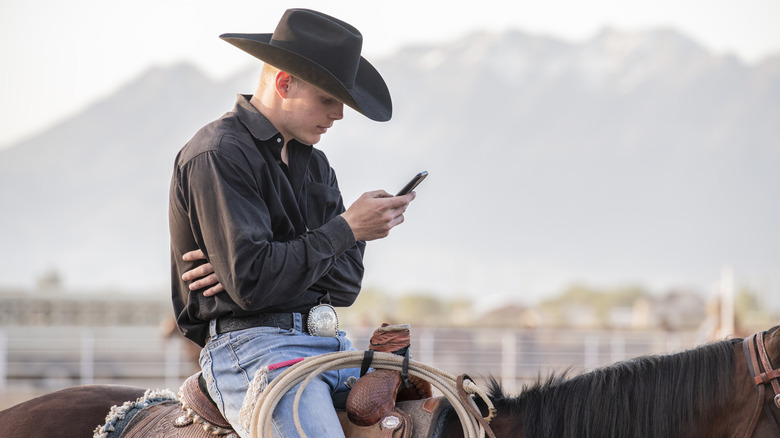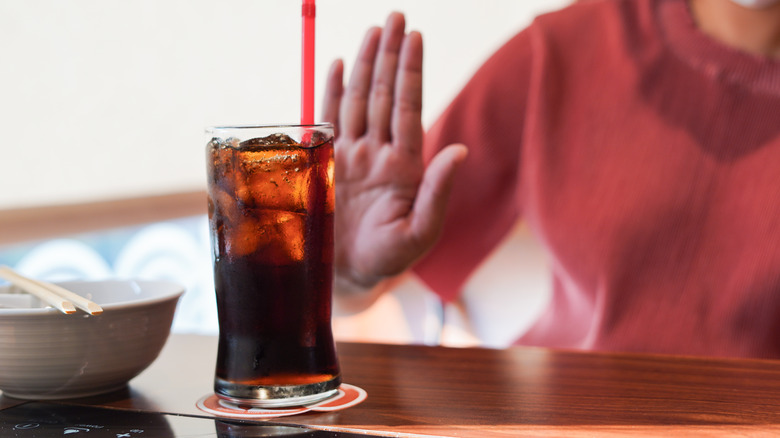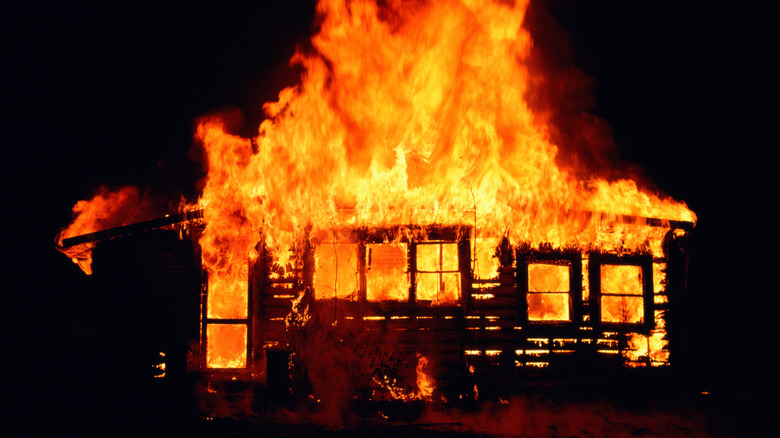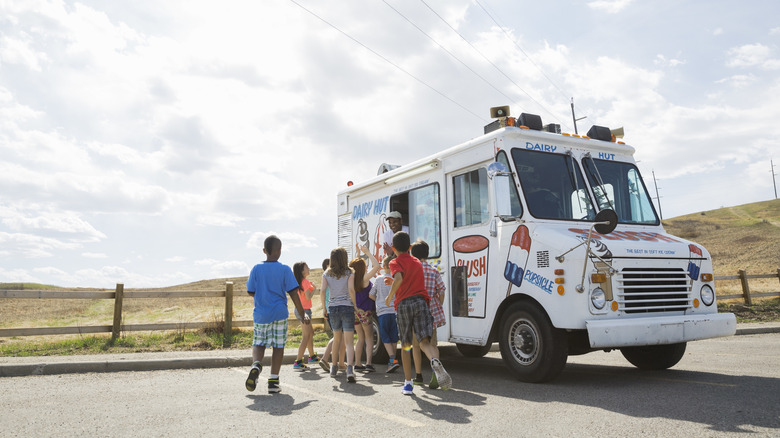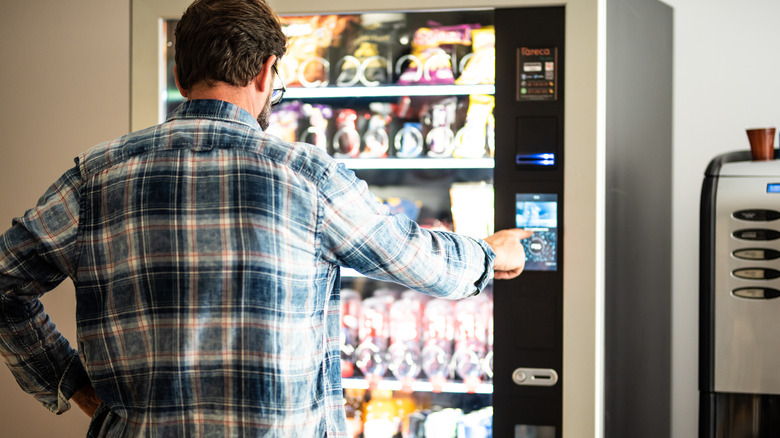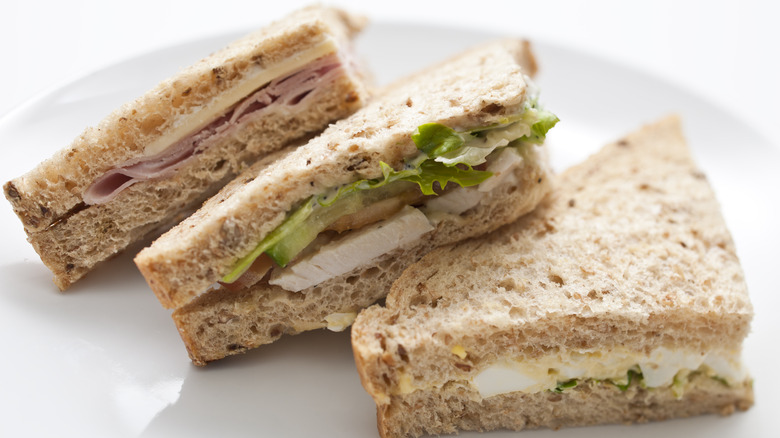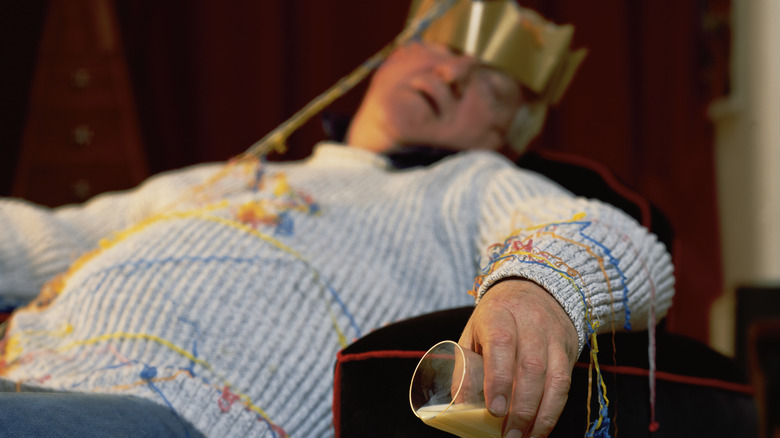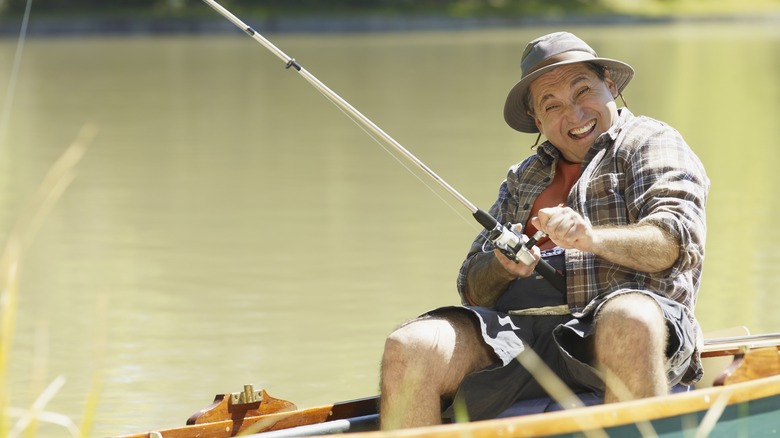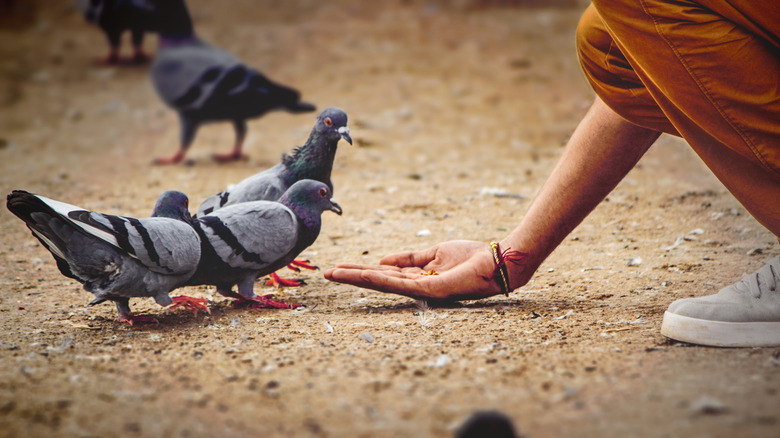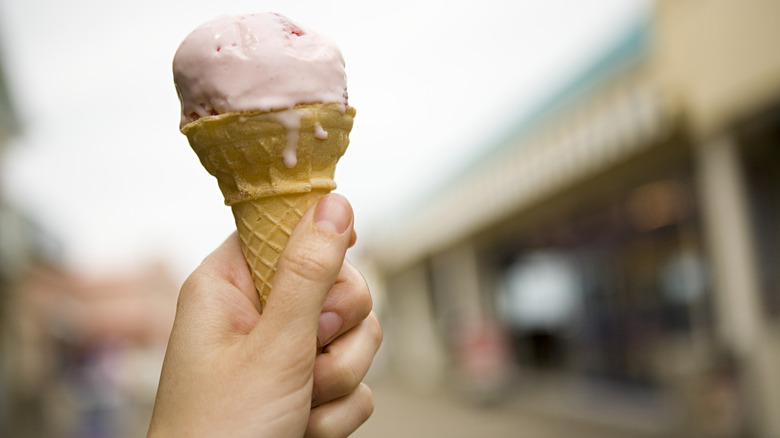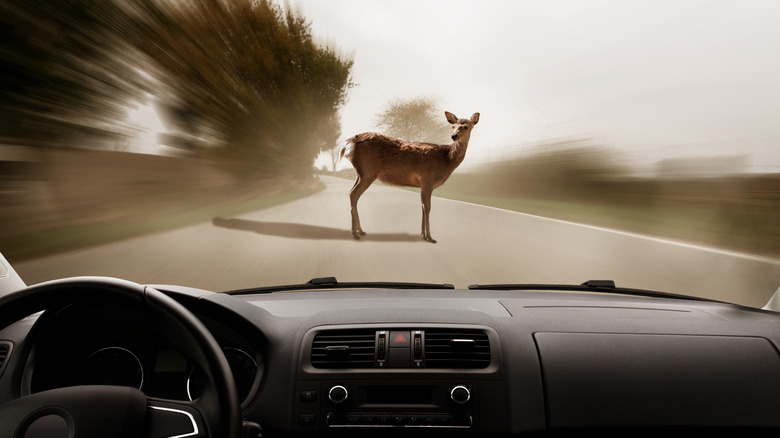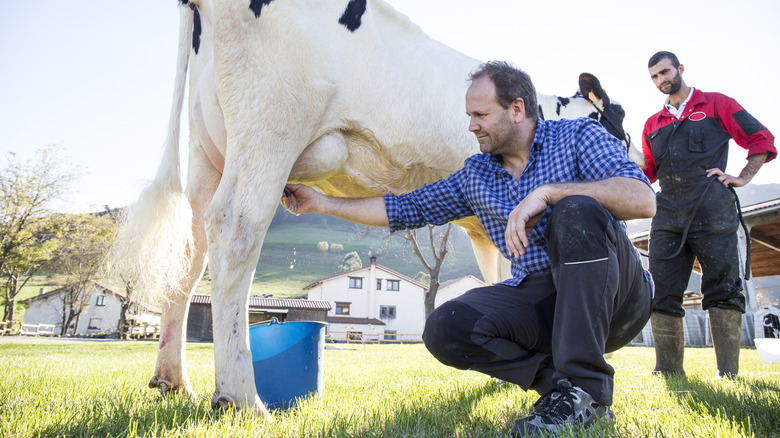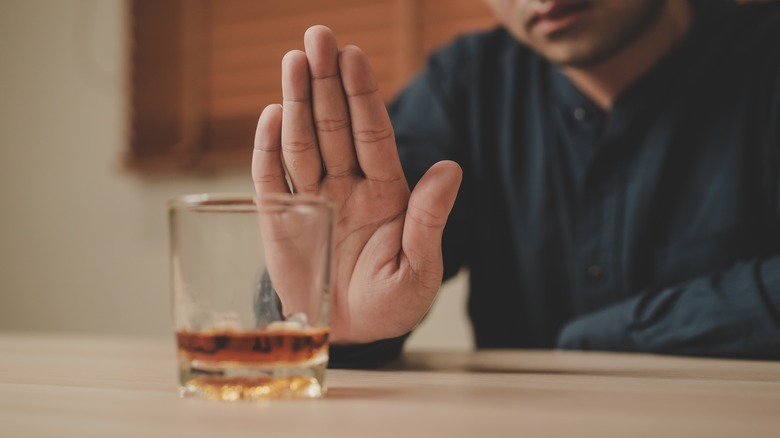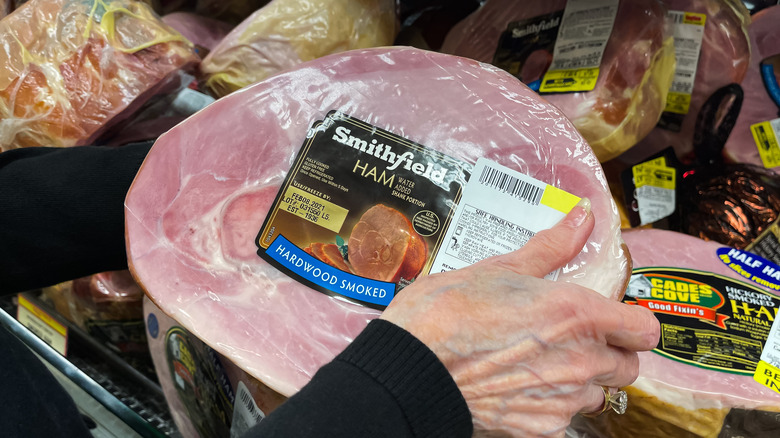The Weirdest Food Laws In Every State
The United States is as vast as it is diverse. Each state has its own distinct identity, from local tourist attractions and accents to culinary habits, and while Federal laws are observed across the country, all 50 states have specific regulations that they adhere to at a local level. These laws represent local sensibilities, diversity of opinions, and distinct lifestyles. Some of the mandates observed at the state level have been in existence for decades, while others are more recent. What each of these state laws has in common is that, at some point, something required state legislatures to look at a situation and vote to enter these laws into existence.
As far as laws regulating various aspects of food consumption are concerned, these laws can get oddly specific. Some are so unusual that they appear nonsensical. Others seem like they would be addressed by common sense, leading us to wonder who on earth did what to make it necessary to mandate this legally. Many of them just had us roaring with laughter. Here are the weirdest food laws in every state in the U.S.
Alabama
In Mobile, Alabama, discarding fruit skins, parings, or peels in public is illegal. Areas included are city sidewalks, buses, elevators, theaters, halls, walkways, and parks considered public property. From a safety perspective, this makes sense — stepping on a banana peel could result in a nasty fall.
The city likely had a dispute involving a slip-and-fall accident that necessitated them to institute this law. Our question is, what about vegetable skins, parings, and peels? Why are these not outlawed? Aren't these potentially equally as hazardous? From a cleanliness perspective, though, we can all agree that improperly disposing of any waste is just gross, so this one isn't as weird as it might sound.
Alaska
One of the more bizarre food laws out there comes from Fairbanks, Alaska, where city officials outlawed giving alcohol to a moose. Some stories suggest this was a response to a bar owner who insisted on giving his pet moose a libation. The moose clearly could not hold his liquor and was a mean drunk. Whether or not that story is accurate, we are still slightly perplexed by the law.
In fairness, a moose is a large, scary animal, even when it's sober. A drunk moose sounds like something we wouldn't want to ever encounter. We'd like to propose an addendum — maybe feeding alcohol to any wildlife is a bad idea.
Arizona
Here is a law that has us scratching our heads a bit. It's against the law in Arizona to feed garbage to a pig. The only pigs who may get fed garbage are pigs raised for personal use, and even this requires a state permit.
We're rather curious about what's defined as "garbage" in this law. Pigs are omnivores who are opportunistic feeders. They can thrive on scraps from fruits, vegetables, and even eggs. Are these scraps defined as garbage if they get discarded by humans? Or is this law more directly talking about the potentially hazardous waste that could make a pig sick? We need a little more information on this one.
Arkansas
Little Rock in Arkansas has some specific rules about eating at fast food establishments. First, if you are at or near a drive-in restaurant, drive respectfully. Quick stopping or starting is illegal, as is making loud, sudden noises. In addition, blaring your horn at a sandwich shop after 9 p.m. is strictly prohibited.
It seems like some diners have poor driving etiquette when dining out and can't control their excitement over their Subway sandwiches. Or perhaps they were too impatient after a night on the town to wait calmly for their Jimmy John's. Either way, mind your manners in Little Rock, or you'll end up both hungry and in trouble with the law.
California
The jurisdiction of Hermosa Beach, California, is protective of its sidewalks. They spent good money to install them and don't want anything to damage them. As a result, spilling anything on the sidewalk that might cause damage is illegal. This ordinance includes greasy or toxic substances and specifically cites any salt, rock salt, common salt, or salt brine.
If you're concerned about bad luck, refrain from throwing any salt over your shoulder in Hermosa Beach. You'll have to find another way to keep the bad spirits away. You may also want to order your margarita from a sidewalk Mexican restaurant without salt on the rim. Best not to take any chances.
Colorado
In Boulder, Colorado, don't drink and ride. It is against the law to operate a non-motorized vehicle while under the influence, and in this case, horses qualify as non-motorized vehicles. This law makes some sense. If anyone questions whether these weird laws get enforced, in 2013, a drunk rider did get arrested for riding into traffic while under the influence.
As animal lovers, we think this one's as necessary for the horse as it is for the riders who could end up in an accident. The bottom line — drink responsibly. If you think you are too drunk to ride your horse home safely, you might want to call a cab and ask a friend to take care of your beloved equine until you can sober up.
Connecticut
The state of Connecticut has long been associated with a legendary pickle law. While the legitimacy of this law has been debated, the CT State Library states that no such law actually exists. It's the relic of an article that appeared in the Hartford Courant in 1948, which tells the story of the arrest of two pickle salesmen for selling pickles unfit for human consumption by then Food and Drug Commissioner, Frederick Holcomb, who had the men "drop it one foot, and it should bounce." It did not, and the salesmen were fined $500 for selling fake pickles.
One Connecticut law that does exist, however, prohibits schools from selling coffee, tea, and soft drinks from vending machines or school stores. Sadly, this means that if you're a student in need of a caffeine fix, you're out of luck if you study at a Connecticut school.
Delaware
We can't believe it's not butter — that's what the people of Delaware say when presented with margarine at a dining establishment. Here, the sale and production of oleomargarine — yellow or white — is strictly forbidden, according to state law.
The law goes on to say that serving margarine at a public eating place is illegal unless the proprietor hangs a sign, in clear view of customers, indicating that they use oleomargarine in their menu items. As butter lovers, we kind of love this law, and we also think Julia Child would approve. After all, she famously used butter in almost all of her recipes.
Florida
While there are a few unusual food laws in Florida that had us scratching our heads, one that really perplexed us involved selling food from open-air stands, which is strictly prohibited in Miami Beach. The sale of food can only occur inside an enclosed building, unless a permit is obtained from the city manager.
This one seems like a missed opportunity in a climate that is as hot as Florida. While people are walking around the beach, they often want something refreshing to sip or nosh on to help cool them off, like some freshly squeezed Florida orange juice, without having to brush off all that sand and put on shoes to head into a building.
Georgia
The fine city of Gainesville, Georgia, is the self-proclaimed "Poultry Capital of the World," thanks to its healthy poultry production industry. It hosts an annual spring chicken festival and boasts a chicken monument in the downtown corridor. So it's no wonder that this town takes fried chicken very seriously. So seriously that since 1961, it's been against the law to eat fried chicken with a fork.
Fried chicken is finger-lickin' good and intended to be enjoyed that way. While the law seldom gets enforced, a poor 91-year-old woman was arrested and charged with this crime in 2009 as part of a rather mean-sounding practical joke.
Hawaii
If you enjoy hitting a club, having a cocktail, and busting a move, you may want to pay attention to this one. While visiting certain jurisdictions in Hawaii, such as Maui, it is against the law for people to drink and dance. According to the liquor commission, dancing must be restricted to designated areas only that are free of booze, which can spill and become a slipping hazard.
In 2015, state legislators required the liquor commission to define dancing to help clarify things and eliminate any ambiguity, which wasn't particularly useful since everyone moves differently. While the law isn't often enforced, one venue in Kauai was indeed fined $2,000 for this offense after a special event.
Idaho
The state of Idaho is known for its potatoes. The geography of Idaho is perfect for growing potatoes, with long summer days and cool nights, light volcanic soil, and abundant snow melt to irrigate these magical roots. It should surprise no one that with this dedication to the potato, laws have been established to regulate the superiority of the Idaho potato crop.
Idaho Deluxe potatoes must be a minimum of 2 inches in diameter or 4 ounces in weight, and be no larger than 6 ounces. They must also be free from blemishes, including rot, sunburn, cracks, sprouting, or damage inflicted by mechanical equipment. There are a few exceptions to these rules, but let's face it, Idaho's reputation is at stake here, so maybe this law isn't all that weird after all.
Illinois
Chicago may be known as the Windy City, but it is also the site of one of the great disasters in U.S. history — the Great Chicago Fire. From October 8, 1871, to October 10, 1871, a devastating fire leveled thousands of buildings, killed 300 people, and cost the city about $200 million in damages. The fire claimed an area four miles long and a mile wide, forever leaving its mark on the town. This history may explain why eating inside a burning building is still against the law.
We think this one should go without saying, but it seems like some folks wanted to finish their meal before the place burned down. As some point out, there's no law stopping you from getting your meal to go from a burning building, which makes us chuckle.
Indiana
One of the best foods to consume during the sweltering dog days of summer is a hunk of freshly sliced watermelon. Unfortunately, if you're frequenting the public parks in Beech Grove, Indiana, you'll have to abstain from eating watermelon as it is against the law.
The story goes that the law went into effect when the park clean-up crew got sick and tired of discarded watermelon rinds puncturing plastic garbage bags and making a mess. That said, it remains unclear how often this law is actually enforced. Just to be sure, you may want to consume your watermelon in liquid format, like in this invigorating watermelon basil kiss recipe.
Iowa
Who doesn't love to hear the jingle of an ice cream truck rolling down the street on a hot summer day? Sadly this isn't an option for the kids residing in Indianola, Iowa, where ice cream trucks have been outlawed since 1967!
Reasons given for the existence of this law vary, with one source saying it was to prevent food trucks from Des Moines from impeding upon the business of local ice cream parlors. Another sad story is that the law got enacted after a child got hit by a car while waiting at an ice cream truck. Whatever the cause, if you're searching for a sweet treat, your options are going to the local grocery store to pick up a pint of your preferred flavor or to find yourself a Cold Stone Creamery to create your mash-up.
Kansas
If you've ever tried to purchase a snack at a vending machine, just to have said candy bar get stuck before getting your hands on it, you have likely tried the old hit-and-jiggle trick. However, this often-effective snack retrieval method will get you into hot water in the town of Derby, Kansas, where there's a law in place making it illegal to hit a vending machine.
A better way to dislodge your snack involves lifting and releasing the flap of the dispenser, which should theoretically disrupt the air in the machine enough to dislodge the candy bar. Sadly, if this doesn't work, you'll have to find a less destructive way to channel your hangry frustration.
Kentucky
Who doesn't love a sweet treat in the summer? That said, if you happen to purchase an ice cream cone in Kentucky and need a place to put it while you are paying for it, don't stick it in your back pocket or you'll be breaking the law. Yes, you read that right.
Aside from the fact that putting ice cream in your pocket would be incredibly messy, this law was apparently instituted as a means of preventing horse abduction. In the 1800s, horse thieves would try to lure a horse away from its home by sticking an ice cream cone in their back pockets in hopes that the animal would follow them. To prevent this, lawmakers outlawed the practice.
Louisiana
There may be more to make attendees sad at funerals in Louisiana than just the circumstances warranting a funeral. According to Louisiana law, you can legally only consume three sandwiches at a wake, and any more can land you in hot water.
Though there doesn't appear to be any logical reason for this law, we surmise someone at some point came to a funeral without having eaten before the event and pounded down all the sandwiches, depriving other mourners of their fair share. Some folks make it impossible for the rest of us to have nice things, even at a funeral. That's just something else to cry about.
Maine
Many weird food law lists include a law on the books in South Berwick, Maine, prohibiting vehicles from parking anywhere in front of the branch of Dunkin' on Main Street. The law specifically mentions that you cannot park on the street to a point 25 feet south. This law isn't as looney tunes as it may sound, though.
The issue is that there are no parking spots streetside of this establishment — all parking is in the back. Some folks couldn't be bothered to wait for a parking spot or to drive around the building, abandoning their vehicles in front of the store, blocking traffic, and making things miserable for everyone else. This law helps keep the flow of traffic moving safely. If you need your daily caffeine, it's best to follow the rules and park out back.
Maryland
How many of us grew up with our parents telling us not to go swimming for 30 minutes after eating? The idea was that it could cause stomach cramps or poor digestion, and even though there may be some truth in this, enacting a law banning eating altogether when swimming seems a bit much. Yet, this happened in Maryland, where it's against the law to eat while swimming in the ocean.
We can think of a couple of good reasons for this. For one thing, pollution is bad enough without everyone dropping snack packs into the water. Additionally, eating human food may be hazardous to sea creatures. But perhaps the biggest reason we can think of — leaving a trail of crumbs for hungry sharks to follow straight to you seems like a horrible idea. Save the grilling out for before or after body surfing.
Massachusetts
Attending church is a solemn ritual that many engage in every Sunday as a time for reflection, prayer, and community. And while you may get hungry, this certainly isn't the opportune time to break out a bag of chips or popcorn. Bostonians agree. Though an old law there law no longer gets enforced, it's still on the books, banning worshippers from consuming peanuts in church.
The law, as originally conceived, punished this infraction with up to one year in jail, which seems rather steep. But when you think about it, not only is munching and crunching loudly on peanuts disruptive, peanut shells are messy and can be hazardous if anyone steps on them and falls. Additionally, many people are allergic to peanuts, and you wouldn't want someone to go into anaphylactic shock during the sermon. Perhaps this law isn't as weird as it sounds.
Michigan
Beginning on April 14, 1913, being drunk on a train became illegal in Michigan. According to the law, you cannot board or remain on a train if intoxicated, and you also cannot drink on a train. Additionally, the conductor has the right to have you arrested if they deem you to be intoxicated, and has the right to seize your alcohol.
Any violation of this law will result in a misdemeanor punishable by up to 90 days in prison and a fine of up to $100, although it seldom gets enforced. The law does come with a caveat — you can purchase and drink alcohol from the snack car of the train. They aren't going to pass up on a revenue opportunity. That would be silly.
Minnesota
In 2024, a bill was introduced outlawing the consumption of "nuisance beavers." Prior to this, beaver was legal to eat under any circumstances. The new law only allows for beavers caught during trapping season with a permit to be eaten. "Nuisance beavers" are defined as those trapped because they have damaged personal property or otherwise threatened human health or safety.
This law purportedly protects humans from contracting diseases or parasites, though some opponents believe beavers that are caught for any reason should be fair game for consumption. For the record, beaver meat is lean but can be juicy, and apparently has a distinctive, savory, woodsy flavor without assertive gaminess. Who knew?
Mississippi
This particular law hurts our hearts to even write about because we can't understand why it became necessary to codify it, but it's against the law to sell cat meat for food in Mississippi. Why anyone would want to eat fluffy kitties is beyond us.
Following Mississippi's lead, it became official federal law across the U.S. in 2018. Believe it or not, when the law went into effect, selling the meat of dogs and cats was still legal in 44 states. This federal statute makes the slaughter, transport, possession, sale, or purchase of dog or cat meat a crime punishable by a fine of up to $5,000. Excuse us while we go and cuddle with our fur babies.
Missouri
In Perryville, Missouri, you can only own 20 chickens and one rooster per 20-acre property. This law got enacted to minimize noise complaints, and similar laws exist throughout the U.S., particularly in rural communities where many citizens enjoy raising chickens to supply them with fresh eggs.
Beyond the noise, there are also concerns related to avian-to-human disease transmission, odor and pollution management, and the proliferation of pests within city limits. This type of law isn't so weird. What's different is that many other regulations regarding poultry ownership across the U.S. had far more conservative rules, including outright bans on roosters. If you love the taste of farm-fresh eggs in the morning, there are worse places to be than Perryville, despite this law.
Montana
According to weird laws in the state of Montana, it's illegal to catch fish with a lasso. While this is true, it is also illegal to catch fish using anything other than a hook and single line or single rod, except for under certain narrow circumstances where a net can be used. A bow and arrow (specifically a longbow) may also be used at specific times, with appropriate licensing and permission.
Truthfully, we'd be highly impressed with the rope skills of anyone capable of catching a fish with a lasso. Maybe this skill should get added to the activities on offer at the next county fair, along with tractor pulls, pig-calling contests, and sheep shearing.
Nebraska
We admit that it can be pretty unpleasant being near someone who's just eaten raw onions. Don't get us wrong — onions are incredibly healthy and flavorful. We use them in almost every recipe we make. But there are times and places where eating them is ill-advised, offensive even. According to lawmakers in the town of Waterloo, Nebraska, around 1910, barber shop customers were making a stink about, well, the barbers stinking.
Specifically, the barbers' breath smelled, which made maintaining proper grooming problematic. This situation prompted the local government to institute a ban on the consumption of onions from 7 a.m. to 7 p.m. Locals rejoiced, knowing they no longer had to endure the perils of barber halitosis while getting their locks maintained.
Nevada
They say what happens in Vegas stays in Vegas, except if what happens is you feeding wild animals. This law was originally enacted in 2017 when it was initially forbidden to feed pigeons — which for anyone who's ever visited the famed Las Vegas Strip, is quite a nuisance. The fine for feeding pigeons was originally a hefty $1,000 or six months in jail.
In 2020, the law expanded to include all wild animals, from rabbits to feral cats, but the fine got lowered to $10 for these infractions. This was mainly to curb the spread of diseases transmitted from animals to humans and presumably to discourage these animals from hanging around crowded tourist attractions. Fortunately, there are plenty of other attractions to enjoy in Vegas. Save feeding animals for the petting zoo or at home.
New Hampshire
In 1971, a law was enacted restricting pour holes in restaurant sugar dispensers to be ⅜ of an inch wide. The law was intended to prevent criminals from tampering with the dispensers and poisoning the sugar, although we're pretty sure a clever criminal could figure out a way into the container even with the reduced hole size.
This law's more of a non-issue in today's culture, where most sugar or sweetener comes in individually wrapped packets for sanitary and safety reasons. Frankly, communal dispensers like this make us a bit anxious for several reasons beyond the potential of being poisoned, but we might be germophobes.
New Jersey
If you reside in the city of Newark, New Jersey, and have a craving for a scoop of ice cream after 6 p.m., you may not want to visit your local ice cream parlor. According to an antiquated law, you cannot be sold ice cream after 6 p.m. in the city without a note from your doctor!
Though nobody actually enforces this law anymore, nor does anyone have a clue how this law even came to be, it's technically still in place. Perhaps a better idea is to grab a pint of your favorite store-bought ice cream brand and enjoy the whole thing in silence, without judgment, in the privacy of your own home.
New Mexico
While every state in the union has some version of an indecent exposure law, New Mexico has an additional law prohibiting indecent waitering. This means that someone serving food or beverages to the public at an establishment with a liquor license cannot knowingly or intentionally expose themselves.
This offense qualifies as a petty misdemeanor, punishable by no more than six months in prison and a $500 fine. In addition, the establishment where the violation occurred can have its license to serve alcohol rescinded. Besides the obvious trauma of seeing someone's private parts without consent, we have deep concerns regarding health code violations related to this offense.
New York
New York is one of several states that prohibit sticking an ice cream cone in your back pocket in public on a Sunday. This bizarre rule is similar to the one in Kentucky, but somehow even more specific. In New York, though, it seemingly has nothing to do with horses. Instead, some suggest a link to what are known as Blue Laws.
Blue Laws date back to 1755 and are designed to curtail certain behaviors on Sundays because they're incongruent with religious requirements. Some activities covered under these laws included work, travel, the sale of goods, and the consumption of alcohol. While most of these are no longer observed, some remnants still exist. From a strictly logistical perspective, why would anyone want ice cream on their pants? What a mess.
North Carolina
Kitchen grease is recognized as a valuable commodity in North Carolina. So much so that strict laws are in place protecting its ownership. Stealing, contaminating, or co-opting someone else's kitchen grease is considered a Class 1 misdemeanor in this state.
The punishment for this crime is a fine of up to $1,000. Should the value of said grease be over $1,000, the punishment graduates to a Class H felony, which comes with a sentence of up to 39 months in prison. What's more, if your vehicle operates on biofuel, you need to obtain fuel from a legal distributor. Keep your mitts off the restaurant fryer, even if the grease makes your car smell like french fries while it runs.
North Dakota
While most states have "cottage food laws" on the books, which are designed to regulate the production and sales of homemade food products, the ones in North Dakota are a bit unusual. Only food items that are shelf-stable and free of meat can be sold, and these cannot be sold at restaurants, grocery stores, online, or over the phone.
The last stipulation in this law, which is the most bizarre, is that these homemade food products can only be sold for in-home consumption. Publicly eating these homemade foodstuffs is prohibited. We're not entirely sure how anyone would know if that muffin you're eating on your way to work came from the store or someone's private kitchen but, strangely, that's the law.
Ohio
The laws about selling bread in Ohio are complicated. All bread must have labels indicating weight in ounces, and cannot be sold in units smaller than 12 ounces. A loaf of bread over 12 ounces must be sold in 2-ounce increments above the 12-ounce minimum. However, this law does not apply to rolls or anything considered fancy bread.
Labels must include the weight, name, and address of the manufacturer of the bread, this label should be displayed on the packaging, and each package of bread can only have one tag on display. We wonder what constitutes fancy bread though. Is sourdough bread considered fancy? Rye? A baguette must be considered fancy. It's got a French name and everything. What could be more fancy than that?
Oklahoma
Generally speaking, sleeping on the job is discouraged by all employers, but the city of Guthrie, Oklahoma takes this one step further. According to the Guthrie Code of Ordinances, employers of bakehouses and restaurants must provide separate sleeping areas for employees, that are not located near spaces where food is being prepared, baked, or cooked.
Aside from the obvious issues with productivity, one has to wonder what prompted this ordinance to be put into place. If a chef is catnapping while handling a knife, they're an obvious hazard to themselves and others and probably shouldn't be on the job at all.
Oregon
We don't know about you, but we find it hard to do anything while walking backward. It takes too much concentration. That said, apparently some folks in Marion, Oregon tried to consume donuts while ambulating in reverse and this prompted local authorities to outlaw the practice.
If you want to eat a donut in public while strolling the streets of Marion, that's fine, just make sure you're walking while facing forward. We're curious if any other foods are forbidden from consumption while walking backward though. How about that morning cup of joe? Can you drink that while walking backward? Inquiring minds want to know!
Pennsylvania
If you want to drink in the keystone state, you'd better get familiarized with Pensylvania's famously confusing liquor laws. In 1933, teetotal Governor of the state, Gifford Pinchot, instituted the Pennsylvania Liquor Control Board and tasked it with making purchasing alcohol "as inconvenient and expensive as possible," per to the Philadelphia Inquirer.
Though the laws surrounding the purchase of beer and wine have since gotten less stringent, the purchase of hard liquor is still restricted to government-operated State Stores with limited hours of operation, sourced only from select distilleries. Beer and wine are more readily available but are still subject to stringent laws regarding the amount you can purchase at a time. Stocking up for a party in Pennsylvania may cost you more money for gas than alcohol.
Rhode Island
Somewhere, sometime, someone ruined eating pickles on a trolley for the rest of us in Rhode Island. Indeed, throwing pickle juice on someone while riding a trolley is against the law, and we're fascinated by what exactly caused this law to exist.
Could the pickle juice have gotten spilled by accident? In which case, was this a massive overreaction? Or was someone so angry at a fellow trolley rider for refusing to cede their seat to them that they retaliated by throwing the juice from the pickles they purchased at the local store? Also, why are other modes of public transportation not included in this law? Can't vinegary pickle juice wreak just as much havoc on a subway, train, or bus?
South Carolina
Should you happen to be attending a funeral at the Magnolia Street Cemetery in Spartanburg, South Carolina, we recommend leaving any watermelon at home. At some point, some unruly watermelon eaters rudely spit their watermelon seeds all over someone's grave, causing watermelon plants to sprout, which is highly undesirable in a cemetery with neatly manicured grass.
The result of this strange incident is that it's now against the law to eat watermelon at said cemetery. Whether other snacks are allowed is unclear, but perhaps it's best to wait until after the funeral to satisfy your hunger, and instead just show respect to the family of the deceased.
South Dakota
It's arguably frowned upon to fall asleep at the job in any industry, but in South Dakota, it's illegal to do so while working in a cheese factory. The process of making cheese is rather delicate — care is needed for the proper introduction of rennet or acid to the milk, separating the curds from the whey, testing aging cheeses for mold, and lugging wheels of cheese around without injuring your back. All these require you to be alert and not get in the way of others doing their job safely.
We don't know about you, but cheese is one food we take very seriously. If you're making our wheel of brie or forming our block of Cheddar, you're welcome to cut the cheese but please don't sleep on it.
Tennessee
According to the Tennessee Roadkill Law, collecting wild animals that have been killed on the road is legal if you're taking them home for personal consumption, although certain restrictions apply. Once you obtain the animal, it is necessary to notify the TWRA or local law enforcement within 48 hours.
Bears are a different story, however, because they're an endangered species. You may not remove a bear until a TWRA Agent has come out to the location of the accident and gives you a receipt for the bear. This extra step helps them document the migratory patterns of bears, assess their population, and prevent the sale of bear parts on the black market. Other protected species, including owls, hawks, and other birds of prey, are also illegal to take home.
Texas
Got milk? In Texas, if you don't, keep your mitts off of your neighbor's cow or you might find yourself in hot water with the law. Apparently, it has been illegal to milk someone else's cow since as far back as the late 1800s. That said, this law was apparently removed from the books in 1973, though it is still enforceable as an act of theft of personal property.
If you really want milk with your cookies, just go to the store. It'll save you the hassle of having to milk a cow and pasteurize the milk before drinking it safely. Also, you can buy chocolate milk, which isn't obtainable from any breed of cattle the last time we checked.
Utah
There are several laws regarding the sale and consumption of alcohol in Utah, and one of the more interesting ones is the ability to obtain alcohol when the governor has declared a state of emergency. It's illegal to sell, offer for sale, or otherwise provide alcohol during a state of emergency.
How many of us reach for a glass of wine following stressful situations to take the edge off? What could be more stressful than a state of emergency? How do the citizens of Utah cope? Clearly, they find healthier ways to keep their cool. Honestly, we'd like to know their coping strategies so we can incorporate them into our emergency kits.
Vermont
Another state with stringent laws regarding the sale and consumption of alcohol is Vermont, where it's strictly against the law for anyone under 21 to consume alcohol, even for medicinal or religious purposes. Doctors can't even prescribe medications that have alcohol in them. Priests and ministers are forbidden from serving communion wine to minors, as are parents during the annual Passover Seder.
Some view these harsh laws as a violation of the first amendment of the U.S. Constitution, guaranteeing the right to religious freedom. Regardless of federal regulations, in this state, serving alcohol to a minor is a criminal offense under any circumstances. Grape juice at Passover and Communion it is.
Virginia
Virginia takes its ham very seriously, with the town of Smithfield being considered the ham capital of the world — though residents of the Parma region of Italy and the Iberian Peninsula of Spain might beg to differ. That said, rules regarding the authenticity of a Smithfield ham are strictly regulated. Only ham produced using traditional methods in the town of Smithfield can get the label as an authentic Smithfield ham.
Those who willingly sell fraudulent Smithfield hams face being found guilty of a Class 4 misdemeanor, which comes with a maximum $250 fine. Illegal porcine peddling represents an indignity to the heritage of Virginians.
Washington
Fire hydrants and utility poles are integral parts of a city's infrastructure. They're necessary for public safety and should not get tampered with. For this reason, we found it perplexing Washington needed a law forbidding vending machines from being attached to fire hydrants and utility poles. Specifically about utility poles, the statute notes that something can be attached up to 12 feet above ground level with previous approval from the utility company.
Our brains are spinning. Why would anyone need their snacks dispensed from a vending machine attached to a fire hydrant or a utility pole? Also, how on earth would you reach a vending machine dangling from a utility pole 12 feet off the ground?
West Virginia
While this law isn't weird, per se, what's unusual is that West Virginia is the first to pass a regulation so sweeping in scope. The state has banned the use of numerous synthetic food additives that are purported to exacerbate neurobehavioral issues in children, including several artificial colorings, butylated hydroxyanisole (BHA), and propylparaben.
At time of writing, this law is scheduled to go into effect in school nutrition programs on August 1, 2025, and statewide on January 1, 2028. Many, though not all, of these additives have already been outlawed in the EU over safety concerns, and more than half of the states in the U.S. are following suit, according to CNN, proposing bans on petroleum-based food dyes.
Wisconsin
It would make sense that a state known for making the most cheese in the United States would have strict laws regarding the grading, packaging, and labeling of that cheese. But it's even more complicated than you might think. The list of cheese regulations in Wisconsin is dizzyingly long! Some highlights include defining what constitutes cheese and providing guidelines for what characteristics make a grade AA cheddar versus a grade B cheddar.
Grade AA cheese should be highly pleasing, while Grade B should be fairly pleasing. We aren't entirely sure what these terms mean except that the cheese should be free from undesirable flavors or odors. Additional terms defined in great detail include descriptions of the ideal body and texture of cheese like gassy, mealy, pasty, pinny, slitty, sweet holes, waxy, and weak. Perusing the entire written law can really help you to grasp the intensity of cheese fanaticism in Wisconsin.
Wyoming
According to state law, it's illegal for hunters and fishermen to use aircraft of any kind to catch their prey. This law was amended in 2023 to more clearly define the term aircraft, which was expanded to include any machine or device capable of atmospheric flight, such as airplanes, helicopters, gliders, dirigibles, or uncrewed aerial vehicles, like drones.
To be fair, we suspect these types of aircraft wouldn't especially help a hunter or fisherman anyway, since they're typically quite loud and often scare animals off. If you want to hunt or fish, we suggest doing it the old-fashioned way — with a gun, bow and arrow, rod and hook, or net.


